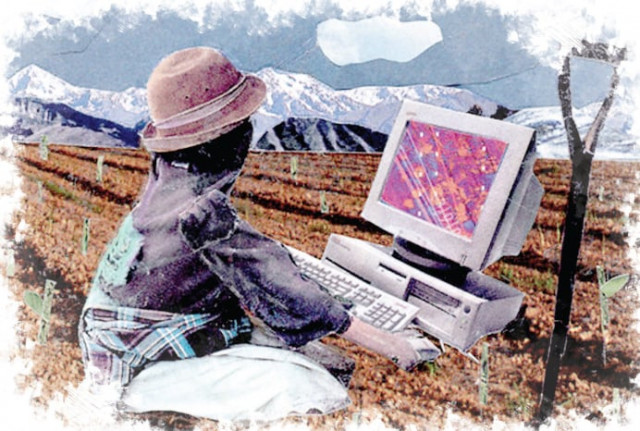How better technology eliminates the need for expensive storage
Vegetable farmers in Punjab have begun relying on greenhouses, which allow them to grow year-round.

For the past five decades, the government’s policy on agriculture appears to have focused largely on controlling prices and quantities – both of agricultural inputs as well as the crops themselves. Yet most agricultural economists now agree that such policies are an inefficient and expensive substitute for investments in productivity enhancements through better infrastructure and use of technology.
Recent development in Punjab’s horticulture – where some of the more prosperous vegetable farmers have begun experimenting with newer technologies – points to a new direction that Pakistani farms might take. Some of the farmers who have been most financially successful have been those that have invested in technology that makes more efficient use of farming inputs, and allows for off-season crops, which eliminates the need for large and expensive storage infrastructure.
Vegetables in Pakistan vary considerably in price depending on season for a reason that have always plagued agriculture: while the crop is usually harvested within a few weeks, it is consumed throughout the year. This results in the absurd situation where tomatoes can cost as low as Rs6 per kilogramme during one season and as high as Rs100 per kilogramme in another season in the same year.
One solution might be to set up large temperature-controlled warehouses. But in a highly energy-deficient country like Pakistan, this option is far too expensive. Another option appears to be to set up relatively smaller greenhouses which, though more expensive than conventional vegetable farming, eliminate the need for storage capacity.

Many farmers in Punjab have begun setting up greenhouses, particular hydroponic greenhouses, that allow them to grow vegetables year-round, including several off-season vegetables. Such greenhouses can result in yields that are between 15 and 20 times higher than normal vegetable farms. Even when taking into account the much higher production costs, greenhouse farmers’ profits often exceed their conventional counterparts by a factor of 10.
“At a time when the population is soaring, greenhouse farming is probably the only way production can keep pace with demand,” said Noor Ali, a greenhouse farmer near Faisalabad.
Given the ability to control temperature and even lighting, greenhouse farmers are not restricted by seasons, and can thus time their crops to match peak demand, and thus command the highest prices. Given the higher turnover in vegetables, such farmers often do not need high storage capacity.
Farmers in central and northern Punjab have begun growing a variety of fruits and vegetables in greenhouses, including tomatoes, lettuce, peppers, carrots, strawberries, cauliflower, capsicum, cabbage, chillies, and okra.
“Our production costs are much higher,” said Tanveer Khan, another greenhouse horticulturalist. “For instance, we can only use hybrid seeds for our production, which are much more expensive than normal seeds.”
Some of the high-end greenhouses require a significant electricity supply – which is scarce in most rural areas – though there are several lower-end options that do not offer the same levels of temperature controls. Given the lack of agricultural financing, farmers buy greenhouse equipment based on their own capital base, which means that only the richer farmers can afford the best equipment.

The Punjab government claims it has begun providing financial support to encourage investments in greenhouses. “We subsidise investments in greenhouses, though we are mostly still at the stage of educating farmers about the benefits of growing off-season vegetables in greenhouses,” said Chaudhry Hameed, a Punjab agriculture department officer in Faisalabad.
The high level of profitability in this sector, however, has already begun to draw the attention of several investors, many of whom have no prior experience in agriculture, including at least one former nuclear physicist who left his job in Canada to set up a vegetable farm outside of Faisalabad.
REPORTING BY IMRAN RANA
Published in The Express Tribune, December 10th, 2012.



















COMMENTS
Comments are moderated and generally will be posted if they are on-topic and not abusive.
For more information, please see our Comments FAQ